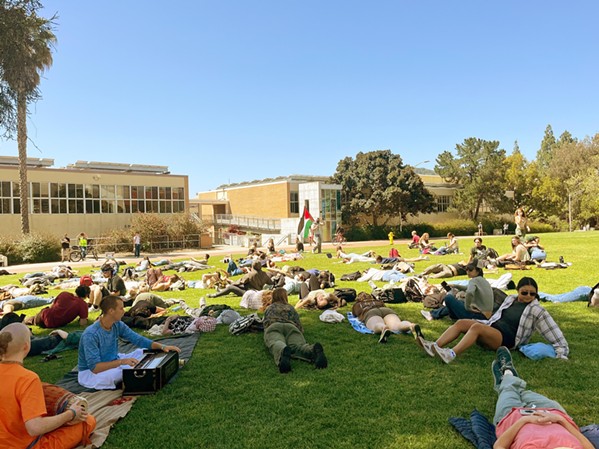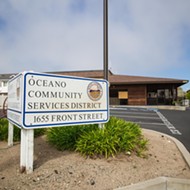As pro-Palestinian protests grow at Cal Poly, some Jewish students express feelings of isolation and fear
By Samantha Herrera[{
"name": "Newsletter Promo",
"id": "NewsletterPromo",
"class": "inlineCenter",
"insertPoint": "4",
"component": "15264767",
"requiredCountToDisplay": "0"
},{
"name": "Ad - Medium Rectangle CC01 - 300x250",
"id": "AdMediumRectangleCC01300x250",
"class": "inlineCenter",
"insertPoint": "8",
"component": "2963441",
"requiredCountToDisplay": "12"
},{
"name": "Ad - Medium Rectangle LC01 - 300x250",
"id": "AdMediumRectangleCC01300x250",
"class": "inlineCenter",
"insertPoint": "18",
"component": "2963441",
"requiredCountToDisplay": "22"
},{
"name": "Ad - Medium Rectangle LC09 - 300x250",
"id": "AdMediumRectangleLC09300x250",
"class": "inlineCenter",
"insertPoint": "28",
"component": "3252660",
"requiredCountToDisplay": "32"
}]
Outcry over the ongoing Israel-Gaza conflict has continued erupting at universities across the country, including at Cal Poly, where students have hosted protests, rallies, and marches, and have made demands.
In a 25-page "divest" shared with New Times, students at Cal Poly laid out a list of demands for the university.
"We the students demand every university fund, donation, or dollar be publicly reported yearly with both the total amount given and who gave it, as well as any other monetary or material resources allocated to universities," the divest reads. "Release a statement affirming the administration's commitment to protecting academic freedom for pro-Palestine faculty, students, and staff."
A freshman philosophy major at Cal Poly, who didn't want to use her name due to concerns about retaliation, told New Times that since Cal Poly is a public university, its administration needs to be transparent when it comes to what it spends student tuition on and who else is funding the school.
"Doing research on Cal Poly investments is incredibly difficult. We also don't know how much they invest, we don't know where the money comes from, we don't know how the money is spent, we just don't know these things," she said. "I think that as a student who pays a lot of tuition for the university, we have a right to know where our money is going and what it's used for."
The divest calls out 22 weapons manufacturers and defense contractors that students believe have financial ties to Cal Poly. Some of those companies include Raytheon, Parsons, Siemens, Lockheed Martin, Lawrence Livermore National Laboratory, Boeing, Honeywell, Fluor, and Chevron.
"It is an incomplete list with very few exact dollar amounts attached, as Cal Poly does not divulge their donations nor who they are partnered with. Cal Poly keeps this information a secret as to distance themselves from the military-industrial complex, but we see what they are," the divest reads. "Each name represents hundreds of thousands of dollars of undisclosed dollars being traded under the table between Cal Poly and the corporations currently manufacturing the Palestinian genocide."
The divest is referring to Israel's response on Oct. 7, 2023, when the political and military organization Hamas, which the U.S. considers a terrorist organization and has governed the Gaza Strip since 2007, bombed and attacked Israel, kidnapped 250 Israelis, and killed at least 1,200, according to the Associated Press. Israel retaliated with a bombing campaign and ground invasion, which the U.S. supports. As of May 10, the Associated Press reported that more than 34,500 had been killed, most of them women and children.
The divest list has prompted protests across campus as more students join the movement, which aims to find the answers to what some students believe Cal Poly keeps hidden.
Momentum among students and faculty grew after Cal Poly first postponed and then ultimately canceled a Social Justice Teach In that was supposed to hold 50 panels and workshops with topics on reproductive justice, science and technology, and Palestine, according to previous New Times reporting.
On Feb. 20, a coalition of Cal Poly's faculty, staff, and students hosted a Justice for Palestine-themed series of discussions, film screenings, and art events in the Berg Gallery. A similar teach-in happened on May 9 where faculty and students hosted a conversation on scholasticide.
Scholasticide refers to the systemic obliteration of education through the arrest, detention, or killing of teachers, students, and staff and the destruction of educational infrastructure, according to the United Nations Human Rights website.
In previous reporting, Assistant Vice President of Communications and Media Relations Matt Lazier told New Times that the university chose to move the date of this year's event in order to give organizers more time to bring in additional speakers and perspectives to the overall programming.
But Cal Poly history senior Ethan Gutterman said the university has never done that in previous teach-ins he's attended.
"There have been teach-ins last year about the racial justice, LGBTQ injustice, and they never had other groups to counterbalance that message," Gutterman told New Times. "So why does the school feel the need to have to counter Palestinian voices with those that are pro-Israel? It just feels very hypocritical and shows that this is like a red line that the school cannot cross for whatever reason, and I would argue that reason is financial and political and socio-economic ties to the war industries, especially those related to the current siege of Gaza we're seeing."
While some view the teach-ins as informational, some Jewish students think such events are isolating and feel like their professors are promoting biased viewpoints.
"I had professors who would promote a lot of false narratives, which were really anti-Semitic," a junior liberal arts major, who requested anonymity, told New Times. "They're saying all this stuff to vulnerable students who are going to obviously take what their professors are saying and believe it. That was really hard for me to hear knowing that what they were preaching to the class was false and hurtful to Jewish students.
"I've had three professors doing that this year."
She didn't want to use her name for fear of retaliation, but she said that trying to connect with her professors on a deeper level has been harder since Oct. 7 because she doesn't feel safe in those classrooms.
"It's been affecting my ability to ask for support from professors even if it's not for anything related to my identity as a Jewish student," she said. "It has affected my ability to pay attention in class."
Lauren Bandari, Hillel executive director for Jewish student life for Cal Poly and Cuesta College, told New Times that she's tried multiple times to create spaces for dialogue with those who are protesting for Palestinian rights but has been met with silence.
"Most of us are pro-Palestinian. We want there to be a future for Palestinians, but we also don't want to be annihilated," she said. "We have a right to existence as Jews and as a country and as a Jewish homeland. I'm all for understanding peers of mine and colleagues of mine, different students, faculty, and staff that hold that truth completely different. I just would love to have partners sitting at a table or on Dexter Lawn talking with each other, not at each other."
Gutterman and the freshman philosophy major both said that when pro-Israeli students or faculty do approach, it can be accusatory.
"They come to our booth, and they heckle us, they try to argue with us, and it's never in good faith, really, because they will come to us and be like, 'Do you believe that Jews have a right to exist?' Like that's not a good faith conversation because some of us are Jewish and we obviously believe that Jews have a right to exist," the philosophy major said. "They're not there to have a dialogue; they're there to argue."
Gutterman, who's a Jewish American, said when he first came to college, he wanted to learn more about his religion, but as soon as he started protesting for the Palestinian people, he felt ex-communicated from the Jewish community.
"Just getting dirty looks for not being super pro-Israel and then also with my family back home in LA," he said. "It's just really frustrating to see our religion, which is full of peace and love, being used to justify the horrific treatment of Palestine for decades."
While the university administration remains silent, Gutterman said that students will continue to protest, march, and rally until Cal Poly answers the divest demands.
"We the students demand that universities publicly condemn the ongoing genocide of Palestinians and call for the United States government to cease all arms deals with Israel," the divest reads. "Call for an immediate and permanent ceasefire." Δ
Reach Staff Writer Samantha Herrera at [email protected].
Latest in News
Comments (4)
Showing 1-4 of 4
Readers also liked…
-

SLO police identify alleged driver who hit and killed couple
Dec 22, 2022 -

When the levee breaks: Oceano residents, county officials walk a tightrope of regulations to manage Arroyo Grande Creek, which some say led to the levee's failure in January
May 18, 2023 -

Cal Poly report highlights offshore wind's potential to spur green energy transition
Jun 8, 2023










